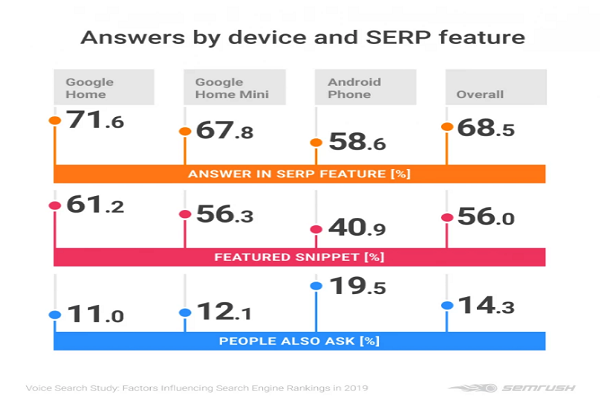Voice search: is it too early to prepare?
Voice search: is it too early to prepare?
The growth of new technologies such as smartphones or home assistants like Alexa or Google Home is creating new opportunities for marketers. With more than 3.5 billion people owning smartphones in the world, and the rise of the sales of smart speakers, Voice Search is a trend that is worth watching. How does it influence marketing strategies and impact SEO optimization? More importantly, how to convert users through Voice Search? These are challenges you need to prepare for if you wish to optimize your website for Voice Search. For years, SEO experts have been waving a red flag and pushing companies to optimize their sites for voice search. But is optimization for voice search essential for online companies today? The controversy is raging in the SEO field.
Optimizing for Voice Search through Position 0: myth or reality?
Voice search is a technology that allows users to search the internet, websites, and applications by saying their request out loud to the chosen device: smartphone, tablet, computer or smart speaker. The user can, for example, initiate a call, start the lecture of a song or search something on the internet. Quicker and more practical than a typed search, the number of Voice Search searches was supposed to explode this year. “By 2020, half of all searches will be conducted through voice. ” Though it is not clear on which sources and studies this prediction is based, you will read this recurrently on the Internet…
According to Google, in 2016 20% of searches through the Android Google App were voice searches. Ever since, no indication was given by the company on the evolution of this rate. Even though we can safely say it is not the case. Though people use it more and more, it has not replaced our browsing habits
What is Position 0?
Another concept associated with Voice Search is Position 0. Position 0 is a search engine result that appears at the top of a SERP (Search Engine Result Page). It ranks before the first organic result which is considered to be in Position 1. Position 0 results are also called featured snippets. They are easily recognizable from other search results by their appearance. The result is displayed in a block with a short extract of its content.

What is position 0?
Pages ranking in position 0 are often results that give a direct answer to the user’s question or request. For example, if the user types “pancakes recipe”, the recipe will be visible in the featured snippet and the user won’t necessarily need to click on the link to access the full recipe. Other examples of searches likely to generate a position 0 result are requests for a definition or a comparison. These types of searches are also called zero-click searches since most of the time the user will look at the answer without pursuing his navigation on the website.
Position 0 and Voice Search
Ranking in position 0 is the most common advice given when asking how to optimize a page for Voice Search. The reason why? Position zero is the page giving the best answer to the user’s request according to Google. It seems logical that these pages are the most prone to be chosen as answers to voice search queries. According to a study by SEMrush, over 60% of results from Google Home are ranking as Featured Snippets, vs 41% for Android.

Statistics on the rate of answers by type of device and SERP features
By improving your visibility, Position 0 will bring you more traffic if you create quality content. It doesn’t mean you shouldn’t optimize your content for your readers, you won’t see a lot of results if you don’t. The other advantage is that a featured snippet is more likely to be chosen as a voice search result.
How to make your pages rank in Position 0
In order to rank in this most desired position, there are some conditions you must fulfill:
- your page needs to be at least in the first SERP, aka the top ten results.
If your website is not ranking well, you have to SEO optimize it so that it will be on the first SERP and thus have a chance to appear as a featured snippet block. - try to answer questions: don’t hesitate to use questions in your headings. The requests generating Position 0 blocks are often “Wh-” or “How” questions, comparisons (ex: Apple vs. Samsung), definitions or step-by-step instructions (recipes).
- organize the structure of your content : use bullet points lists, put the answer to the request just below the question
- create relevant content giving a clear and concise answer to the search query
Marketing for Voice search: what is awaiting us
Optimizing for voice search means SEO experts will have to take into account more than ever the psychology of the user. Which words are they the most likely to use to form his request? Which type of requests are bound to attract the most traffic? And most importantly, how to engage with a user through the use of an AI which only gives the most basic answer to his questions? These points will be essential for any company wishing to seize the opportunities created by voice search.
Suggestion of personalized content, advertising or shopping through voice search: who knows what the future will bring? With the development of AI and the improvement of human/machine interactions, converting users could be taken to a whole new level. Amazon’s smart speaker Alexa has thus recently acquired new capabilities. She can now be programmed to express emotions and use different speaking styles through the tone of her voice. She is thus capable of simulating an enthusiastic or sad voice. Curious to hear what it sounds like? See the video below and make your mind on whether Alexa sounds fake or not!
The future of Voice Search
Even though the rise of Voice Search is a controversial subject, it is important to know that it is already having an impact on Search Engine Results. What we don’t know is to what extent it will influence marketing strategy. Though its development is slower than expected, it doesn’t mean Voice Search won’t be instrumental in the future in terms of user behavior. It has the potential to change our navigation habits on the Internet and even our everyday life through connected homes and objects. Now that you know what is at stake, think about what it means for your company if you want to implement it in your marketing strategy. Though it might be the future of digital marketing, don’t forget about today!
Written by Marie-Claire Niger
Sources (Click here!)
Other articles
-

Discover our online Master’s CAWEB Program in digital communication
-

The importance of a good translation and localization for the pharmaceutical industry
-

Why You Should Do Your Masters Abroad
-

Challenges and difficulties of video game localization
-

GDPR Compliance on Social Media for Business



